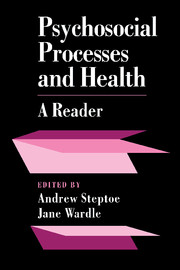Book contents
- Frontmatter
- Contents
- Preface
- Section 1 Life stress, social support and health
- Section 2 Psychophysiological processes in disease
- Section 3 Personality, behaviour patterns and health
- Coronary heart disease in the Western Collaborative Group Study: final follow-up experience of 81/2 years
- Anger-coping types, blood pressure, and all-cause mortality: a follow-up in Tecumseh, Michigan (1971-1983)
- Pessimistic explanatory style is a risk factor for physical illness: a thirty-five-year longitudinal study
- Effectiveness of hardiness, exercise and social support as resources against illness
- Section 4 Health practices and the modification of health risk behaviour
- Section 5 Coping with illness and disability
- Section 6 Behavioural interventions in medicine
- Index
Anger-coping types, blood pressure, and all-cause mortality: a follow-up in Tecumseh, Michigan (1971-1983)
from Section 3 - Personality, behaviour patterns and health
Published online by Cambridge University Press: 05 August 2016
- Frontmatter
- Contents
- Preface
- Section 1 Life stress, social support and health
- Section 2 Psychophysiological processes in disease
- Section 3 Personality, behaviour patterns and health
- Coronary heart disease in the Western Collaborative Group Study: final follow-up experience of 81/2 years
- Anger-coping types, blood pressure, and all-cause mortality: a follow-up in Tecumseh, Michigan (1971-1983)
- Pessimistic explanatory style is a risk factor for physical illness: a thirty-five-year longitudinal study
- Effectiveness of hardiness, exercise and social support as resources against illness
- Section 4 Health practices and the modification of health risk behaviour
- Section 5 Coping with illness and disability
- Section 6 Behavioural interventions in medicine
- Index
Summary
Abstract
Julius, M. (U. of Michigan, School of Public Health, Ann Arbor, MI 48109- 2029), E. Harburg, E. M. Cottington, and E. H. Johnson. Anger-coping types, blood pressure, and all-cause mortality: a follow-up in Tecumseh, Michigan (1971-1983). Am J Epidemiol 1986; 124:220-33.
This study examined prospectively (1971-1983) the relationship between anger-coping types, blood pressure, and all-cause mortality in a sample of men and women aged 30-69 (n = 696) of the Tecumseh Community Health Study. Subjects who indicated that they were likely to suppress their anger in response to two hypothetical anger-provoking situations had 1.7 times the mortality risk of those who expressed their anger (95% confidence interval (CI) = 1.03-3.05). Subjects who suppressed their anger when unjustifiably confronted by their spouse had twice the mortality risk of those who expressed their anger (95% CI = 1.13-3.38). For high vs. low suppressed anger towards a policeman, the mortality risk was 1.24 (95% CI = 0.72-2.14). These relationships were invariant across age, sex, and education groups, even when medical risk factors were adjusted for, i.e., smoking, relative weight, blood pressure, coronary heart disease status, forced expiratory volume at one second (FEV1), and chronic bronchitis. However, suppressed anger measures significantly interacted with elevated blood pressure to predict the highest mortality risk. These results suggest that persons with high mortality risk can be identified in part by how they cope with anger, and by the joint effect of anger-coping type (a behavioral trait) and elevated blood pressure (a biological trait).
anger; blood pressure; follow-up studies; mortality
The association between anger-hostility and health status has long been emphasized by researchers, with particular attention given to cardiovascular disorders such as coronary heart disease and hypertension (1-6), as well as to coronary heart disease complications of hypertension (7). Recent investigations have also indicated that anger-hostility may be the most important “coronary prone behavior” that underlies the confirmed relationship between the Type A behavior pattern and both the incidence of coronary heart disease in prospective studies (8) and the severity of basic coronary artherosclerosis (9, 10).
The purpose of the present study was to examine the relationships between anger-coping types, blood pressure, and all-cause mortality. These anger types, namely keeping “anger in” or letting “anger out” were first suggested by Funkenstein et al. (3), by classifying behaviors to laboratory-induced provocation; later, a self-report measure was developed by Harburg et al.
- Type
- Chapter
- Information
- Psychosocial Processes and HealthA Reader, pp. 215 - 234Publisher: Cambridge University PressPrint publication year: 1994
- 2
- Cited by



